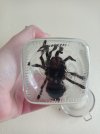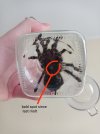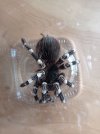I sadly lost my Acanthoscurria geniculata female earlier today, After hours of mourning and crying, because damn she was one of my first tarantulas and I'm so sad to lose her, I'm trying hard to think of reasons. She had been with me good 3 years, I got her as sexed juvenile female when she was about 5 cm. I can't remember how many times she has molted in my care, but at least a few. She was good 8 cm now.
She had always been a good eater, though since her last molt, maybe about a year ago, I've noticed she had "calmed down". Just gotten less active and way more sensitive than before - hiding a lot, scared of food items. Since she was like that for a long time but without any big issues, since she looked healthy and ate sometimes, it didn't alarm me. The last molt was kinda hard for her, she didn't move very well after it for few days but it got eventually normal. The last few month before today's passing, she has mainly stayed inside her hide, only moving a little from it and drank water, lots of water. Always when I misted, she came out to drink. I know the humidity in my house is often low, but that's why I have been very careful with misting my tarantulas' enclosures, at least every week with the ones who need higher humidity, and always a full waterdish. It gets a bit better during summer, but winters are very dry.
I had another A. geniculata at the same time as her for a while, and that tarantula also died after showing similar signs. Got less and less active, drank a lot, then one day dead. Not even curled up, just dead. They were very similar situations, but what was different about this death, the tarantula's legs were very hard. The other geniculata's body was soft and limp.
Now, I'm not very sure about the cause. I'm fairly sure it can't have been any sort of poisoning, I'm very careful with chemicals and avoid them at all costs, also I never use them inside my tarantulas' room. Any chemicals through windows is also not possible, I've never had them open.
I haven't handled the geniculata ever, never even touched it's food with my hands. If I needed to pick up something from its enclosure, I always use tongs.
I'll attach pics of the enclosure and her body, sorry I couldn't get better ones because I was in a hurry.
The substrate I use is typical jungle bedding, holds humidity well. I've noticed often people use it for reptiles and frogs. I use it with all of my tarantulas, and never had an issue with them.
Feeders I use most often are superworms, mealworms and crickets, sometimes occasionally I've fed beetle grubs and silkworms. I've fed the feeders vegetables, fruits and oatmeal, like often recommended.
I've heard that calcium sometimes has affected tarantulas badly? I don't give them calcium since they don't need it, but could it be possible to come along with the feeders, if they had ate something with lots of calcium etc.
Now, if you have ideas or similar experiences, I'm more than open to hear them. I don't want this to happen again. I feel like I become paranoid whenever some of my other tarantulas act a less active. I fear that this outcome might come to them as well slowly, if it is something wrong with my place or care.
Impaction is also something I've considered, but I don't really want to cut my tarantula open to see.
She had always been a good eater, though since her last molt, maybe about a year ago, I've noticed she had "calmed down". Just gotten less active and way more sensitive than before - hiding a lot, scared of food items. Since she was like that for a long time but without any big issues, since she looked healthy and ate sometimes, it didn't alarm me. The last molt was kinda hard for her, she didn't move very well after it for few days but it got eventually normal. The last few month before today's passing, she has mainly stayed inside her hide, only moving a little from it and drank water, lots of water. Always when I misted, she came out to drink. I know the humidity in my house is often low, but that's why I have been very careful with misting my tarantulas' enclosures, at least every week with the ones who need higher humidity, and always a full waterdish. It gets a bit better during summer, but winters are very dry.
I had another A. geniculata at the same time as her for a while, and that tarantula also died after showing similar signs. Got less and less active, drank a lot, then one day dead. Not even curled up, just dead. They were very similar situations, but what was different about this death, the tarantula's legs were very hard. The other geniculata's body was soft and limp.
Now, I'm not very sure about the cause. I'm fairly sure it can't have been any sort of poisoning, I'm very careful with chemicals and avoid them at all costs, also I never use them inside my tarantulas' room. Any chemicals through windows is also not possible, I've never had them open.
I haven't handled the geniculata ever, never even touched it's food with my hands. If I needed to pick up something from its enclosure, I always use tongs.
I'll attach pics of the enclosure and her body, sorry I couldn't get better ones because I was in a hurry.
The substrate I use is typical jungle bedding, holds humidity well. I've noticed often people use it for reptiles and frogs. I use it with all of my tarantulas, and never had an issue with them.
Feeders I use most often are superworms, mealworms and crickets, sometimes occasionally I've fed beetle grubs and silkworms. I've fed the feeders vegetables, fruits and oatmeal, like often recommended.
I've heard that calcium sometimes has affected tarantulas badly? I don't give them calcium since they don't need it, but could it be possible to come along with the feeders, if they had ate something with lots of calcium etc.
Now, if you have ideas or similar experiences, I'm more than open to hear them. I don't want this to happen again. I feel like I become paranoid whenever some of my other tarantulas act a less active. I fear that this outcome might come to them as well slowly, if it is something wrong with my place or care.
Impaction is also something I've considered, but I don't really want to cut my tarantula open to see.



